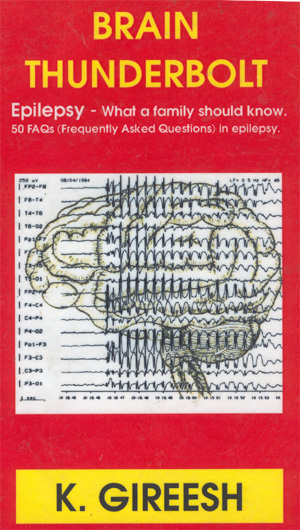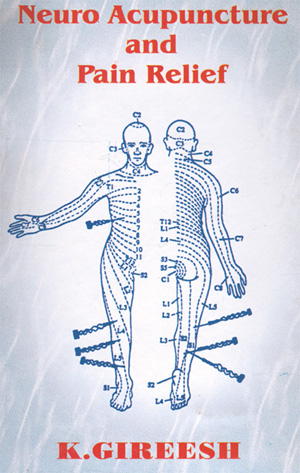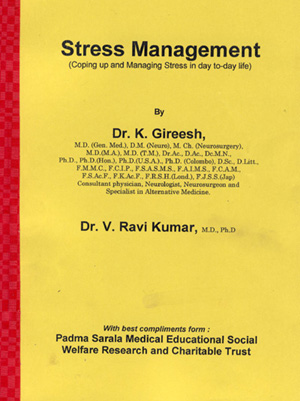 |
 |
|
|
| |
 |
The
unique approach used in this book on the diagnosis
and treatment of epilepsy is quite exhilarating.
At a quick glance, the work may appear to be little
more than a pocket book of questions and answers
to be followed pedantically. It is indeed much
more than that. It is a basic source of well authenticated
information about epilepsy for an audience ranging
from medical students to experienced epileptologists.
Specifically this book is a true campanion to
general practitioners or family physicians who
are faced with a volley of questions from an epileptic
patient. This volume offers a well balanced approach
to the effective management of epileptics. It
also dwells with the psychological concerns of
epilepsy. All those who scan this book will find
a well refined practical treatise on the essential
elements of the diagnosis and treatment of epilepsy.
Doctors and patients alike will in my view find
this book of inestimable benefit.
Prof.
Testuo Kanno
Professor of Neurosurgery
Fujita Health University
Japan
|
|
| |
 |
There
exists only one kind of human death ; the irreversible
loss of capacity of consciousness combined with
irreversible loss of capacity of breathlessness
( and hence to sustain a spontaneous beat). All
the death in this perspective is of brain stem
death. A diagnosis of brain stem death have two
implications. The first, pragmatic, was that the
heart will inevitably stop within a relatively
short period. The second, philosophical, was that
quite independently of the cardiac prognosis,
an individual with a dead brain stem was already
dead (because of irreversible unconsciousness
and irreversible apnoea). In the present volume
the authors have employed the question and answer
approach in describing all aspects of brain death.
The book is intended to cover the kind of questions
commonly encountered in academic institutions
for teaching students, the residents and especially
in the intensive care. This book will be of immense
use to physicians, neurologists, neurosurgeon,
transplantation surgeons of all disciplines. I
must congratulate the authors for their sincere
effort in summarizing the current literature on
brain death.
Prof.
Testuo Kanno.
Professor and Chairman,
Department of Neurosurgery,
Fujita Health University,
Japan
|
|
| |
 |
This
Books is About Epilepsy - What a family should
know, It has been written in such a manner by
answering common questions which arise in ones
mind when one thinks about eiplepsy. These are
of course the same questions which my patients
ask me repeatedly in my outpatient clinic and
I am sure all practitioners of all disciplines
will definitely encounter these in their day to
day practice.
|
|
| |
 |
Having
qualified with distinction from the International
School of Acupuncture, Peoples Republic of China,
and practising Acupuncture for over 15 years,
especially in painful disorders, this author is
uniquely qualified to present the synthesis of
his experiences in this classic publication. His
excellent clinical results from the underpinnings
of this clinical oriented publication.
Dr. K. Gireesh is unique in that he is a physician,
neurophysician and neurosurgeon and, at the same
time, a consultant specialist in Alternative Medicine,
as well. Therefore, he is the model of the futuristic
healer of integrated medicines. Dr. K. Gireesh
is a man for all seasons, indeed a model healer
of the third millennium. In my lifetime, having
visited some 133 countries. I am yet to see a
doctor who has such unique wide spectrum qualifications,
charisma, humanitarianism and clinical sense.
In this book the quintessential thoughts of both
western and Chinese concepts of the common painful
disorders have been well described and illustrated
for the reader to analyse the commonalities and
differences.
|
|
I
most certainly feel that a knowledge of both modern
science and traditional ideas are essential for
a student of acupuncture in today's scientific
milleu. The anatomy and physiology described here
is very useful in order to obtain a correct perspective
of modern scientific acupuncture. Updating acupuncture
as Neuro acupuncture is interesting and timely
because acupuncture acts basically by stimulating
the nervous and neurohumoral mechanisms of the
body.
This book also highlights both the traditional
methods of diagnosis as well as the western system
of scientific diagnosis. This, again, is very
essential for today's students of modern scientific
acupuncture practice.
This publication differs from all other acupuncture
text books as this is based on modern scientific
concepts. The chapter on the scientific basis
of acupuncture basis of acupuncture explains the
different mechanisms by which it operates. A thorough
knowledge of the anatomy f the entire human body
is, therefore, extremely essential because one
should know what structures through which the
needle is penetrating, so that one can avoid complications.
A careful perusal of this book clearly shows that
the science of acupuncture will continue to blossom
in the future among the scientific doctors. With
Scientists like this author, who are able to explain
acupuncture on a scientific basis, acupuncture
will soon enter the portals of mainstream orthodox
medicine.
I am sure, that this classic will definitely serve
to stimulate the scientists and clinicians to
carry out further research in the field of acupuncture.
No doubt, this publication of Dr. K. Gireesh will
make important strides in that direction in the
future practice of acupuncture, to gain not only
scientific acceptance but an exponential upsurge
of clinical practise, the world over.
Lord Pandit Prof. Dr. Sir Anton Jayasuria
Chairman
Medicina Alternativa Dean, Open International
University for Complementary Medicine
Chief Consultant, Institute of Acupuncture,, Homoepuncture
& Lasertherpay,
Colombo South General Hospital, Kalubowila, Sri
Lanka
|
|
| |
 |
This
Books is About Epilepsy - What a family should
know, It has been written in such a manner by
answering common questions which arise in ones
mind when one thinks about eiplepsy. These are
of course the same questions which my patients
ask me repeatedly in my outpatient clinic and
I am sure all practitioners of all disciplines
will definitely encounter these in their day to
day practice.
|
|
| |
|
| |
| |
|
|
 |